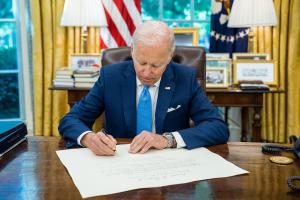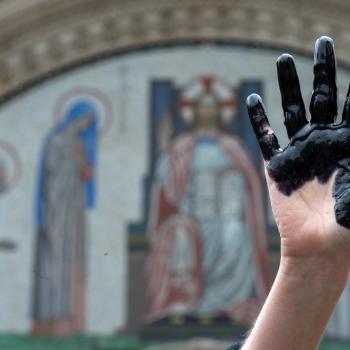
Climate change is a reality, not mere speculation. This is why, instead of just theorizing what will happen in the future, we can see climate change is already causing grave harm to the world. Hot zones, floods, extreme storms, droughts, and even pandemics, are all connected to climate change. Things will only become worse if we do not take climate change seriously. Indeed, we should have taken it seriously many years ago. Pope Benedict XVI’s 2010 message on the 43rd Day of Peace is more relevant today than when he spoke it: “Sad to say, it is all too evident that large numbers of people in different countries and areas of our planet are experiencing increased hardship because of the negligence or refusal of many others to exercise responsible stewardship over the environment.” [1] And, as Patriarch Bartholomew explained, Christian theology (and not just Orthodox theology) points to the interdependent relationship between humanity and the rest of creation; this is why we should not be surprised that our sins will have a negative impact on the world in which we live, an impact which can find itself manifested in climate change:
Orthodox theology takes a further step and recognizes the natural creation as inseparable from the identity and destiny of humanity, because every human action leaves a lasting imprint on the body of the earth. Human attitudes and behavior toward creation directly impact on and reflect human attitudes and behavior toward other people. Ecology is inevitably related in both its etymology and its meaning to economy; our global economy is simply outgrowing the capacity of our planet to support it. [2]
Those who deny that humanity can influence, and shape, the environment by its activity, and thus, cause climate change, must reject the Christian teaching that the fall of humanity has had a negative impact on the world. Whether or not we take the story of Adam literally or symbolically, we can learn from it that human sin causes great pain and sorrow upon the whole of creation. The more we sin, the more we destroy the world around us, the more the natural goodness of the Earth is covered up by our filth, the more the world can be said to rebel against us. That rebellion is revealed to us in the way the world is not seen or experienced as paradise by us. How can Christians deny climate change when such change is found in their creation myths?
Every step we take to stop our sinful treatment of the Earth, every step we take to heal the damage we have done to the Earth, is a good which we should embrace. We can and should recognize those steps, while accepting that there will be many more for us to take in the future. This is why the environmental measures being undertaken to deal with climate change in the Inflation Reduction Act are important, for they represent a major step forward the United States is taking to deal with the problem at hand:
The Inflation Reduction Act of 2022, passed today by the U.S. Congress, is considered by many to be the largest investment in the fight against climate change ever made by the federal government. The legislation commits $369 billion to programs in energy security and climate change mitigation over the next 10 years—all with the goal of reducing carbon emissions by roughly 40% by 2030 (compared to 2005 levels). The bill also provides substantial funding for environmental justice efforts to give vulnerable communities the resources to develop and implement the clean energy technologies supported by the legislation.[3]
While some might wonder what connects environmental efforts with inflation reduction, the answer is simple: it will help make sure the costs connected to climate change, costs which will affect inflation, are lessened, even as it will help produce jobs which will help the economy. To deal with inflation, we not only have to deal with the immediate context in which we find ourselves, but to prepare for the future to make sure we tackle future problems today. If our environmental recklessness is not fixed, we will find ourselves dealing with all kinds of costly crises which will have significant impacts on the economy:
Our present crises – be they economic, food-related, environmental or social – are ultimately also moral crises, and all of them are interrelated. They require us to rethink the path which we are travelling together. Specifically, they call for a lifestyle marked by sobriety and solidarity, with new rules and forms of engagement, one which focuses confidently and courageously on strategies that actually work, while decisively rejecting those that have failed. Only in this way can the current crisis become an opportunity for discernment and new strategic planning. [4]
Some have said that we should let nature take its course, for in the end, nature has the means to heal itself. And in a sense, this is true, but only if we let nature do its work; but our actions can impede nature’s ability to act, which means, we can prevent it from healing the harm which we have caused to the world. Nonetheless, the Inflation Reduction Act takes this into consideration; it wants to make sure that nature will be free to do what it needs to be done to heal the damage we have caused to the world:
But beyond those headline-making investments, the legislation acknowledges a less-heralded but essential part of the effort to combat climate change: nature. Or, more precisely, that given a chance, nature can be a profound ally in the fight against climate change.[5]
When we ignore our role with climate change, we will keep subverting nature, and so we will continue to make things worse, not better. This is why those who say nature, by itself, without any help for us, can and will deal with climate change are wrong.
The Inflation Reduction Act is to be commended for the way it takes climate change seriously. It is a monumental step in the right direction. But we cannot rest. We must continue to take action. We are at a crisis point. We must resist the temptation to rest in our laurels, or worse, to be indifferent to climate change because we think we will not experience the worst of it ourselves (showing no care or concern for future generations of humanity). Even if all we care about is the way it affects us, we should see that what is happening is enough to indicate that we must deal with climate change, for are already being negatively impacted by its effects. On the other hand, though we are having to deal with a major crisis, one which we created for ourselves, we can and should look to the future with hope. We should see that if we act now, we still have the time we need to fix things. Indeed, Christians should believe, just as sin can cause great harm to the world, grace can repair the wounds of sin. Thus, though we must take climate change seriously, we must not abandon hope and think we can’t overcome it. For, as Pope Francis said, Christianity tells us we must avoid all despair; its teaching is not only that of the past and what we have done wrong, but it is also about grace, and how grace can make things better, not only in our lives today, not only for the world in the future, but for eternity:
So, let us look at ourselves, and let us ask ourselves: will this prophetic reversal announced by Mary affect my life? Do I believe that to love is to reign, and to serve is power? Do I believe that the purpose of my life is Heaven, it is paradise? To spend it well here. Or am I concerned only with worldly, material things? Again, as I observe world events, do I let myself be entrapped by pessimism or, like the Virgin, am I able to discern the work of God who, through gentleness and smallness, achieves great things? Brothers and sisters, Mary today sings of hope and rekindles hope in us. Mary today sings of hope and rekindles hope in us: in her, we see the destination of our journey.[6]
Everything which exists form one interdependent whole, one interdependent reality. The way our actions help cause climate change is one way we can see the truth of this. Our actions can and will have an impact on the rest of creation. Now is the time to deal with what we have done. Now is the time to repent of our sins, the sins which have harmed the Earth, and make restitution for them. For the time being, we still have time to heal the Earth, and make things better.
[1] Pope Benedict XVI, “Messages for the 43rd Day Of Peace.” Vatican translation. (1-1-2010). ¶ 7.
[2] Patriarch Bartholomew I, Encountering the Mystery: Understanding Orthodox Christianity Today (New York: Doubleday, 2008), 94.
[3] Wick Eisenberg, “With Inflation Reduction Act, U.S. Sees Landmark Action On Climate Change” in The Hub (8-12-2022).
[4] Pope Benedict XVI, “Messages for the 43rd Day Of Peace. ¶ 5.
[5] Brady Dennis, “As Congress Funds High-Tech Climate Solutions, It Also Bets On A Low-Tech One: Nature,” in The Washington Post (8-14-2022).
[6] Pope Francis, “Angelus, August 15, 2022.” Vatican translation.
Stay in touch! Like A Little Bit of Nothing on Facebook.
If you liked what you read, please consider sharing it with your friends and family!













